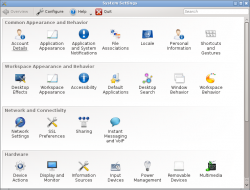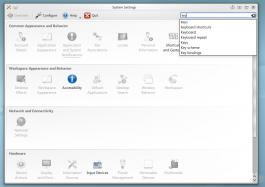System Settings/zh-tw: Difference between revisions
Appearance
Updating to match new version of source page |
Updating to match new version of source page |
||
| Line 159: | Line 159: | ||
|} | |} | ||
<span class="mw-translate-fuzzy"> | |||
[[Category:桌面/zh-tw]] | [[Category:桌面/zh-tw]] | ||
[[Category:系統/zh-tw]] | [[Category:系統/zh-tw]] | ||
[[Category:設定/zh-tw]] | [[Category:設定/zh-tw]] | ||
</span> | |||
Revision as of 11:25, 17 May 2012
特性
- 全局性的 KDE 平臺配置中心
- 方便的自定義,管理你的桌面
- 幫助定位設置模塊的搜索功能
搜索
系統設置 有個搜索功能幫助定位要找的設置模塊位置。在工具欄的搜索框輸入,系統設置會高亮包含關鍵詞的設置模塊,同時黯淡其他無關模塊。還可以透過 KRunner 訪問到系統設定模組。
You can also search for and open System Settings modules in KRunner.
分類
通用外觀與行為
{{{3}}}
[[File:{{{2}}}|48px|link=Special:myLanguage/System Settings/Account Details]] 設定你的用戶信息,密碼和路徑。你還可以配置社會化桌面提供方。 {{{3}}}
[[File:{{{2}}}|48px|link=Special:myLanguage/System Settings/Application Appearance]] 設定應用程式風格,顏色,圖示,字型和表情圖示。 Application and System Notifications

Configure the notifications you want to receive from the system, and from applications File Associations

Set default actions and icons for different types of files. Locale

Language, numeric, and time setting for your particular region. Allows you to apply translation (locale) to whole KDE Desktop or change spellchecker parameters. Personal Information

Configure the resources used to manage your address book, calendar, and notes Shortcuts and Gestures

Configure keyboard shortcuts and mouse gestures.
Workspace Appearance and Behaviour
Desktop Effects

Configure desktop effects such as window animations, transparency, or the desktop cube. Workspace Appearance

Configure the appearance of windows, cursors, and the desktop. Accessibility

Settings to help users who have difficulty hearing audible cues, or who have difficulty using a keyboard. Default Applications

Set the default applications for common tasks, such as browsing the web, writing email, or managing files. Search Desktop

Settings for the desktop search engine. Window Behaviour

Configure task switching, and how windows respond to mouse actions. Workspace Behaviour

Settings for overall workspace behaviour and virtual desktops.
Network and Connectivity
Bluetooth

Use Bluedevil to set up connections to your Bluetooth devices. Network Settings

Preferences for your network connections and proxy settings. SSL Preferences

Manage SSL certificates. Sharing

Settings for sharing files with Windows machines over a network.
硬體
Device Actions

Configure which actions are available when a new device is connected to your machine. Digital Camera

Settings for connecting to your digital cameras. Display and Monitor

Configuration of your monitor(s) and screensaver settings. Information Sources

Configuration of hardware for network, remote control, and modems. {{{3}}}
[[File:{{{2}}}|48px|link=Special:myLanguage/System Settings/Input Devices]] 設定你的鍵盤,滑鼠和搖杆。 Power Management

Global settings for the power manager. Removable Devices

Configure automatic handling of removable storage media. Multimedia

Configure the handling of audio CDs
系統管理
Actions Policy

Configure policies for trusted actions in the system. Date & Time

Settings for date and time. Font Installer

Install, manage, and preview fonts. Global Policy Configurations

Configure global settings for system policies. {{{3}}}
[[File:{{{2}}}|48px|link=Special:myLanguage/System Settings/Login Screen]] 設定登入管理器(KDM). Permissions

Software Management

Get and remove software, and manage automatic updating of software. {{{3}}}
[[File:{{{2}}}|48px|link=Special:myLanguage/System Settings/Startup and Shutdown]] 設定啟動或關閉時的系統行為



